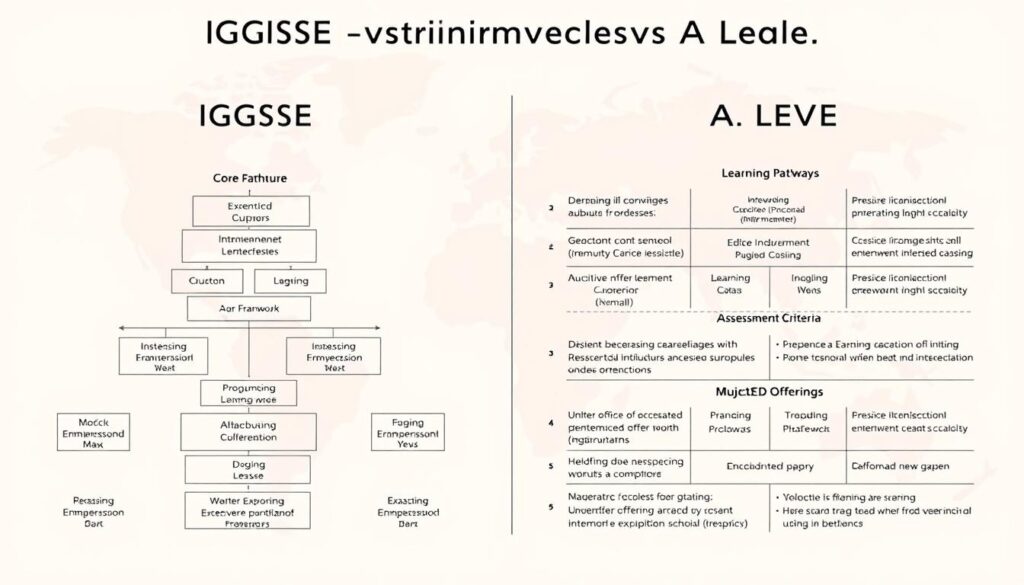Did you know that 80% of students make common mistakes in their IGCSE A Level exams that could easily be avoided? These errors, such as misreading questions or poor time management, often lead to lost marks and missed opportunities for top grades. As a parent, you understand how crucial these exams are for your child’s future education and career prospects.
The IGCSE A Level has evolved into a rigorous academic milestone for students aged 14-16, laying the foundation for university applications and future success. However, the advanced curriculum and demanding exam structures can overwhelm even the most diligent students. Common pitfalls like neglecting revision, ignoring exam instructions, and failing to practice with past papers are frequent obstacles.
This is where expert tutors play a vital role. At Getutor, we specialize in connecting students with experienced, Cambridge-trained tutors who understand the latest curriculum changes and examiner expectations. Our tutors offer personalized support, helping students identify and overcome their unique challenges. With a proven track record of improving grades and boosting confidence, our free matching service ensures your child receives the tailored guidance they need to excel.
Key Takeaways
- 80% of students make avoidable mistakes in IGCSE A Level exams.
- Mastering common errors early can significantly improve academic outcomes.
- Expert tutors provide personalized support to address individual weaknesses.
- Getutor offers a free tutor matching service for tailored learning solutions.
- Students who receive personalized tutoring often achieve higher grades and increased confidence.
Overview of the IGCSE A Level and Its Evolution
The IGCSE A Level system has a rich history that reflects the evolution of secondary education globally. Originally designed in the UK, these qualifications have become a cornerstone for students aiming for higher education and professional success.
History and Educational Context
The IGCSE, or International General Certificate of Secondary Education, was introduced to provide a more flexible and internationally recognized alternative to traditional GCSEs. Over the years, it has gained prominence worldwide, with over 145 countries adopting it. The A Level, traditionally a UK-based qualification, has also evolved to meet the demands of a global education system.
Historically, both qualifications have undergone significant changes. The shift from alphabetical grading (A*-G) to numerical scales (9-1) has standardized assessments, making it easier for universities worldwide to compare student performance. This change has also streamlined the grading process, ensuring consistency across different regions.
Evolution from Traditional GCSE Structures
Compared to the traditional GCSE, the IGCSE offers a broader range of subjects, allowing students to explore diverse fields of interest. This flexibility has made the IGCSE particularly popular in international schools. The A Level, while maintaining its rigorous academic standards, has introduced new subjects like Data Science and Sustainable Engineering to cater to modern academic and career trends.
The transition from IGCSE to A Levels is a critical phase for students. It demands a higher level of academic commitment and time management. Expert tutoring plays a pivotal role here, helping students bridge the gap between these two stages. Tutors not only address academic challenges but also guide students in selecting subjects that align with their future aspirations.
Understanding this evolution is essential for parents. It helps in making informed decisions about their child’s education, ensuring they are well-prepared for the challenges and opportunities ahead. By choosing the right support, parents can empower their children to achieve their full potential in these critical qualifications.
Deep Dive into igcse a level Framework
Understanding the A Level framework is crucial for students aiming to excel in their studies. This system emphasizes subject specialization, allowing students to dive deep into their chosen fields. However, it also offers flexibility, enabling a broader curriculum approach for those who prefer diverse learning.
Specialization Versus Broader Curriculum Approaches
Specialization in A Levels lets students master specific subjects, which is beneficial for university admissions. For example, focusing on sciences can strengthen applications for medical or engineering programs. On the other hand, a broader approach provides a well-rounded education, which some universities value.
Both methods have their merits. Specialization enhances expertise, while a broader curriculum fosters adaptability. Choosing the right path depends on a student’s academic goals and interests.
Comparative Analysis with IGCSE and IB Systems
The A Level system differs from IGCSE and IB programs in its structure. A Levels focus on in-depth study of 3-4 subjects, whereas IGCSE offers a wider range of subjects with both core and extended options. The IB program emphasizes critical thinking and community service alongside academic rigor.
A Levels are known for their specialized approach, preparing students for university-level studies. This focus helps students develop strong analytical and problem-solving skills, which are highly regarded by universities worldwide.

Expert tutors play a key role in guiding students through these frameworks. They help clarify complex subjects and exam formats, enabling students to navigate their chosen path effectively. With the right support, students can overcome challenges and achieve their academic goals.
Mastering A-Level Topics: Strategies for Success
Academic success in A-Level courses requires more than just attending classes. Students need well-structured strategies to manage their time, resources, and study materials effectively. With the right approach, they can master even the most challenging subjects and achieve their academic goals.
Effective Study Techniques and Resource Allocation
To excel, students should adopt proven study techniques. Active recall, for instance, can improve memory retention by up to 50%. Additionally, breaking study sessions into manageable chunks using methods like the Pomodoro technique enhances focus and productivity.
- Active Recall: Test yourself regularly on key concepts.
- Study Groups: Collaborate with peers to gain different perspectives.
- Past Papers: Practice with past exam papers to familiarize yourself with formats and question types.
Leveraging Expert Tutoring for Academic Improvement
Expert tutors can guide students in refining their study strategies and avoiding common mistakes. They provide personalized support, helping students understand complex topics and develop effective exam techniques. Tutors also help students create structured study plans, ensuring they cover the entire curriculum without feeling overwhelmed.
| Study Method | Pros | Cons |
|---|---|---|
| Active Recall | Improves memory retention | Requires consistent practice |
| Study Groups | Enhances understanding through discussion | Can be distracting if not focused |
| Past Papers | Builds exam familiarity | Time-consuming |
“Investing in expert tutoring is one of the most effective ways to boost your child’s performance and confidence.”
By combining effective study techniques with expert tutoring, students can overcome challenges and achieve academic success. Parents should consider these strategies to support their child’s journey through advanced level studies.

Addressing Common Mistakes and Challenges
Every student faces unique challenges during their A-Level journey. Common pitfalls include misreading exam questions, poor time management, and inadequate preparation. These issues can significantly impact grades and university prospects. However, with the right strategies and support, students can overcome these obstacles and achieve their academic goals.
Identifying Typical Pitfalls in A-Level Studies
One of the most frequent mistakes is rushing through questions without understanding them fully. This often leads to avoidable errors. Additionally, many students struggle with time management during exams, leaving them stressed and unable to complete all sections. Proper preparation and practice can help mitigate these issues.
| Common Mistake | Solution |
|---|---|
| Misreading Questions | Take a moment to read each question carefully before answering. |
| Poor Time Management | Allocate specific time slots for each section of the exam. |
| Inadequate Preparation | Regularly practice with past papers and seek feedback. |
Practical Tips to Overcome Struggles
Expert tutors can provide personalized guidance to address these challenges. They help students develop effective study habits and exam techniques. For instance, practicing with past papers not only builds familiarity with exam formats but also improves time management skills. Additionally, regular assessments and feedback sessions can help students identify and strengthen their weak areas.

By addressing these common mistakes head-on, students can enhance their academic performance and confidence. Getutor’s expert tutors specialize in helping students navigate these challenges, ensuring they are well-prepared for their exams and future educational pursuits.
Benefits of Private Tuition and How to Get Started
Private tuition offers a personalized approach to learning, helping students overcome specific challenges and achieve their academic goals. With tailored support, students can improve their understanding and performance in A-Level studies.
Role of Private A-Level Tutors in Personalized Learning
Private tutors provide one-on-one attention, addressing each student’s unique needs. They help students grasp complex concepts, improve study techniques, and prepare effectively for exams. This personalized approach often leads to better grades and increased confidence.
Exploring Getutor.com’s Free Matching Service
Getutor’s free matching service connects students with experienced tutors who understand the latest curriculum changes. This service is designed to be user-friendly, allowing parents to find the right tutor quickly and efficiently. By investing in private tuition, parents can give their children the support they need to excel in their A-Level studies.

With the right tutor, students can master challenging subjects and achieve their academic aspirations. Getutor’s service ensures a tailored learning experience, helping students succeed in their A-Level journey.
Conclusion
In conclusion, mastering A-Level studies is a critical milestone for students, offering a gateway to future academic and professional success. As highlighted throughout this article, 80% of students encounter common pitfalls that can be easily avoided with the right strategies and support. The evolution of the IGCSE and A-Level systems has provided students with a structured yet flexible academic path, preparing them for university admissions worldwide.
By adopting effective study techniques such as active recall and time management, students can significantly improve their performance. Additionally, expert tutoring plays a pivotal role in addressing individual challenges and reinforcing weak areas. Getutor’s free matching service simplifies the process of finding the perfect tutor, ensuring personalized support tailored to each student’s needs.
Parents, we encourage you to take the next step in securing your child’s academic future. Visit Getutor.com.hk/en/findtutor today to explore our free tutor matching service. Empower your child with the tools they need to excel in their A-Level journey and beyond.
FAQ
What is the difference between the IGCSE and the A-Level qualifications?
The IGCSE (International General Certificate of Secondary Education) is typically taken at the end of secondary education, while the A-Level (Advanced Level) is a post-secondary qualification. Both are recognized internationally but serve different stages of education.
How does the IGCSE curriculum compare to other international systems?
The IGCSE offers a broad range of subjects and is known for its flexibility. It is often considered equivalent to other systems like the IB (International Baccalaureate) but is more focused on individual subject mastery.
What are the advantages of studying for A-Level exams?
A-Level qualifications are highly valued by universities worldwide. They demonstrate advanced knowledge in specific subjects and prepare students for undergraduate studies. Additionally, they often include both exams and coursework.
How long does it typically take to complete an A-Level course?
Most students take two years to complete their A-Level studies, divided into two parts: AS-Level (Advanced Subsidiary) in the first year and A2-Level in the second year.
Can students from non-English speaking countries excel in IGCSE exams?
Absolutely. The IGCSE is designed to be accessible to students worldwide, including those in non-English speaking countries. Many schools offer additional English language support to help students succeed.
How does the assessment process work for A-Level subjects?
A-Level assessments typically include written exams, coursework, and sometimes practical exams, depending on the subject. The final grade is based on a combination of these components.
What is the minimum age requirement to take IGCSE exams?
There is no strict minimum age, but most students take the IGCSE at around 16 years old, after completing secondary education.
How do IGCSE and A-Level qualifications impact university admissions?
Both qualifications are widely recognized by universities. A-Levels are particularly popular in the UK, while IGCSEs are often preferred for international applications due to their broader curriculum.
Are there any specific subject requirements for A-Level courses?
Yes. Students typically need to have strong grades in relevant subjects at the IGCSE or equivalent level to pursue A-Level studies. Some subjects may also require prerequisite knowledge.
Can I take A-Level exams privately without attending a school?
Yes, it is possible to take A-Level exams as a private candidate. However, you will need to find an approved exam center and may need to arrange your own study materials and support.
How does the grading system work for IGCSE and A-Level exams?
IGCSE grades range from A* to G, while A-Level grades range from A* to E. Both systems use a percentage scale to determine grades, with higher percentages corresponding to higher grades.
What support is available for students struggling with A-Level coursework?
Many schools offer additional tutoring, study groups, and private tutors to help students with challenging coursework. Online resources and past exam papers are also widely available.
How does the IGCSE prepare students for university applications?
The IGCSE provides a strong foundation in core subjects and develops critical thinking and study skills. It also offers a wide range of subjects, allowing students to explore their interests before university.
Are A-Level qualifications accepted by universities outside the UK?
Yes, A-Level qualifications are recognized by universities in many countries, including the US, Canada, Australia, and others. However, some universities may require additional assessments or qualifications.
What is the cost of taking IGCSE or A-Level exams?
Exam fees vary depending on the country and the number of subjects taken. On average, IGCSE exams cost between and 0 per subject, while A-Level exams may range from 0 to 0 per subject.
How does the IGCSE differ from the traditional GCSE?
The IGCSE is tailored for international students and offers more flexibility in subject choices. It is also designed to be more challenging and prepares students for further education globally.
Can students combine IGCSE and A-Level qualifications?
Yes, many students take IGCSE exams at the end of secondary school and then proceed to A-Level studies. This pathway is common in international education systems.
What is the role of private tutors in A-Level preparation?
Private tutors provide personalized support, helping students understand complex topics, improve exam techniques, and manage their study time effectively. They are particularly useful for challenging subjects like mathematics and sciences.
How can I find the best private tutors for A-Level subjects?
You can find qualified tutors through recommendations, tutoring agencies, or online platforms. Many parents also use Getutor.com, which offers a free matching service to connect students with expert tutors.


